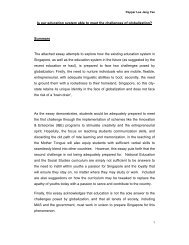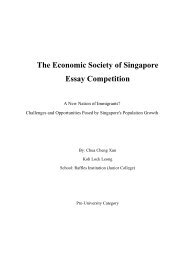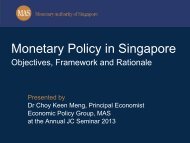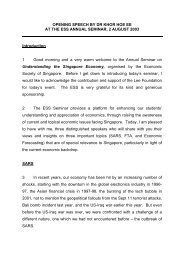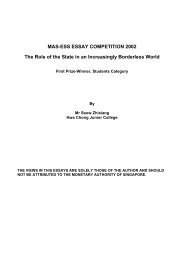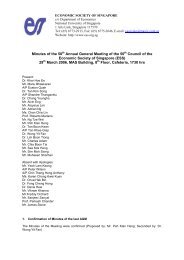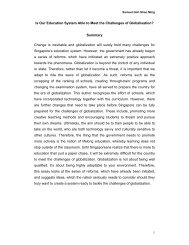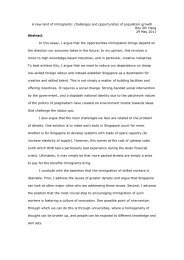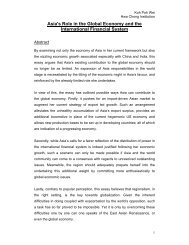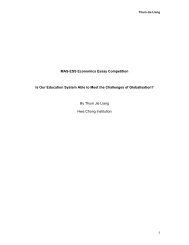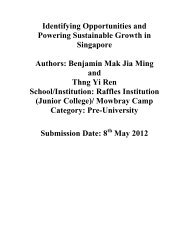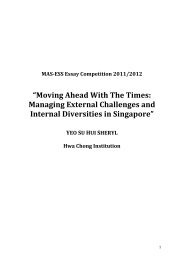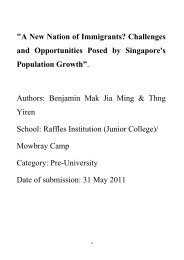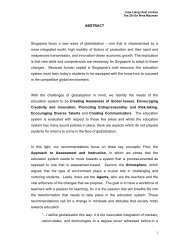the role of the state in an increasingly borderless world - Economic ...
the role of the state in an increasingly borderless world - Economic ...
the role of the state in an increasingly borderless world - Economic ...
- No tags were found...
Create successful ePaper yourself
Turn your PDF publications into a flip-book with our unique Google optimized e-Paper software.
elief. Decisions <strong>of</strong> <strong>the</strong> herd are collective ones. They are not made; <strong>the</strong>y happen, <strong>an</strong>d <strong>the</strong>y<br />
happen because m<strong>an</strong>y <strong>in</strong>vestors <strong>in</strong>dividually make decisions simult<strong>an</strong>eously <strong>an</strong>d on similar<br />
grounds to <strong>in</strong>vest or to withdraw <strong>the</strong>ir funds. Do what displeases <strong>the</strong> herd, <strong>an</strong>d it will trample<br />
you <strong>in</strong>to <strong>the</strong> ground. Globalisation is shaped by markets, not by governments.” 10<br />
The “herd” moves vast amounts <strong>of</strong> capital <strong>in</strong> <strong>an</strong>d out <strong>of</strong> countries accord<strong>in</strong>g to <strong>the</strong>ir<br />
political <strong>an</strong>d economic merits, <strong>an</strong>d <strong>the</strong> State is powerless to challenge its will. Countries that<br />
wish to attract capital have to don what Friedm<strong>an</strong> terms <strong>the</strong> “Golden Straitjacket”, a package <strong>of</strong><br />
policies <strong>in</strong>clud<strong>in</strong>g bal<strong>an</strong>ced budgets, economic deregulation, openness to <strong>in</strong>vestment <strong>an</strong>d trade,<br />
<strong>an</strong>d a stable currency. 11 “As your country puts on <strong>the</strong> Golden Straitjacket, two th<strong>in</strong>gs tend to<br />
happen: your economy grows <strong>an</strong>d your politics shr<strong>in</strong>k”. 12 In <strong>an</strong> <strong>in</strong>creas<strong>in</strong>gly <strong>borderless</strong> <strong>world</strong>,<br />
capital markets severely curtail a <strong>state</strong>’s freedom <strong>of</strong> m<strong>an</strong>oeuvre <strong>in</strong> economic policy. This is <strong>the</strong><br />
new context with<strong>in</strong> which <strong>state</strong>s are forced to operate.<br />
Given that cont<strong>in</strong>ued <strong>in</strong>flows <strong>of</strong> capital are a necessary <strong>in</strong>gredient for economic success,<br />
<strong>an</strong>d that <strong>the</strong> tendency for capital flight is higher <strong>the</strong> higher <strong>the</strong> <strong>in</strong>tegration <strong>an</strong>d globalisation <strong>of</strong><br />
f<strong>in</strong><strong>an</strong>cial markets, a key <strong>role</strong> <strong>of</strong> <strong>the</strong> <strong>state</strong> is <strong>the</strong>refore simply about giv<strong>in</strong>g markets what <strong>the</strong>y<br />
w<strong>an</strong>t. Owners <strong>of</strong> capital w<strong>an</strong>t a stable environment for <strong>in</strong>vestment, so <strong>the</strong> provision <strong>of</strong><br />
macroeconomic stability rises to a new level <strong>of</strong> import<strong>an</strong>ce.<br />
Increased <strong>in</strong>ter-<strong>state</strong> competition for capital forces <strong>state</strong>s <strong>an</strong>d <strong>the</strong>ir central b<strong>an</strong>ks to<br />
concentrate on <strong>the</strong> goal <strong>of</strong> price stability <strong>in</strong> order to attract or avoid a dra<strong>in</strong> <strong>of</strong> mobile capital.<br />
High <strong>in</strong>flation is generally perceived by markets to be a signal <strong>of</strong> bad policy <strong>an</strong>d a proxy for<br />
political <strong>an</strong>d economic <strong>in</strong>stability. States are forced <strong>in</strong>to a similar straitjacket with regard to<br />
bal<strong>an</strong>c<strong>in</strong>g government budgets. Short-term b<strong>an</strong>k debt has led m<strong>an</strong>y a develop<strong>in</strong>g country <strong>in</strong>to<br />
trouble. The debt crisis, for example me<strong>an</strong>t that <strong>the</strong> 1980’s were a lost decade for Lat<strong>in</strong><br />
America. The problem was one <strong>of</strong> governments borrow<strong>in</strong>g heavily to f<strong>in</strong><strong>an</strong>ce recklessly large<br />
budget deficits. With such lessons <strong>in</strong> m<strong>in</strong>d, <strong>borderless</strong> f<strong>in</strong><strong>an</strong>cial markets place a premium on<br />
<strong>state</strong> fiscal conservatism.<br />
While government deficits are problematic, <strong>the</strong> case <strong>of</strong> corporate borrowers <strong>in</strong><br />
develop<strong>in</strong>g countries becomes more complicated. These non-government entities occasionally<br />
borrow amounts that seem <strong>in</strong>dividually prudent given certa<strong>in</strong> macroeconomic assumptions --<br />
such as no devaluation <strong>of</strong> <strong>the</strong> currency -- but which become collectively unsupportable if those<br />
assumptions turn out to be wrong. This happened <strong>in</strong> East Asia <strong>in</strong> <strong>the</strong> 1990s, with <strong>the</strong> fur<strong>the</strong>r<br />
complication that much <strong>of</strong> <strong>the</strong> borrow<strong>in</strong>g was ch<strong>an</strong>nelled through domestic b<strong>an</strong>ks, which me<strong>an</strong>t<br />
that <strong>the</strong> ultimate borrowers were unaware <strong>of</strong> <strong>the</strong>ir exposure to system wide exch<strong>an</strong>ge rate risk.<br />
Some governments even went so far as to encourage signific<strong>an</strong>t amounts <strong>of</strong> foreign borrow<strong>in</strong>g<br />
by firms without <strong>in</strong>termediation from domestic b<strong>an</strong>ks <strong>an</strong>d f<strong>in</strong><strong>an</strong>cial <strong>in</strong>stitutions. This po<strong>in</strong>ts to <strong>the</strong><br />
import<strong>an</strong>ce <strong>of</strong> regulation <strong>an</strong>d oversight <strong>of</strong> <strong>the</strong> b<strong>an</strong>k<strong>in</strong>g sector. 13<br />
10 This characterisation <strong>of</strong> <strong>the</strong> “electronic herd” is provided by Kenneth Waltz, <strong>in</strong> his 1999 James Madison Lecture at<br />
<strong>the</strong> Americ<strong>an</strong> Political Science Association, “Globalisation <strong>an</strong>d Govern<strong>an</strong>ce”.<br />
11 See Friedm<strong>an</strong> (2000), pp. 101-111.<br />
12 Friedm<strong>an</strong> (2000), p. 105.<br />
13 Where such regulation is impossible due to immaturity <strong>of</strong> <strong>in</strong>stitutions, <strong>the</strong>re may be some <strong>role</strong> for capital controls.<br />
Taxes or controls on short term currency <strong>in</strong>flows may well be better th<strong>an</strong> <strong>the</strong> extreme alternatives <strong>of</strong> no <strong>in</strong>flows on<br />
one h<strong>an</strong>d, <strong>an</strong>d completely unrestricted <strong>in</strong>flows <strong>in</strong>termediated by a weakly or corruptly regulated domestic f<strong>in</strong><strong>an</strong>cial<br />
system.<br />
30



